Conversation Ends As Man Who Wants Purebred Dog Tells His Partner That Any Stray Dog She Adopts Is Hers Alone, Redditors React
It would be better if you first asked yourself certain questions before going out and getting a dog. Are you really prepared to own a dog, or do you just want to be among pet owners?
You should know that a dog requires a lot of care and is often a 12–15 year commitment. This commitment costs money, requires emotional investment, and takes time.
All dog lovers, however, concur that it is all worthwhile, so are you truly prepared? Before bringing a dog into your life, it's crucial that you are sure and ready.
This entails creating a budget, changing your way of living, and talking to other members of your household. A wonderful way to assist a dog in need is to adopt a dog from a shelter or rescue organization.
While they wait for their forever homes, many homeless dogs are put to death when those homes never materialize. One dog can benefit from your actions, and that dog will be your friend forever.
The OP of today's story and his partner both want a dog. However, she is adamant that as long as stray dogs need a home, she won't adopt any other way.
The OP wants to adopt from a reputable breeder for his first dog, given his inexperience. But when he discusses it with his partner, the conversation ends abruptly, as long as they are not talking about how cute strays are.
So now the OP is asking...

The OP tried steering the conversation towards adopting from a reputable breeder for his first dog experience
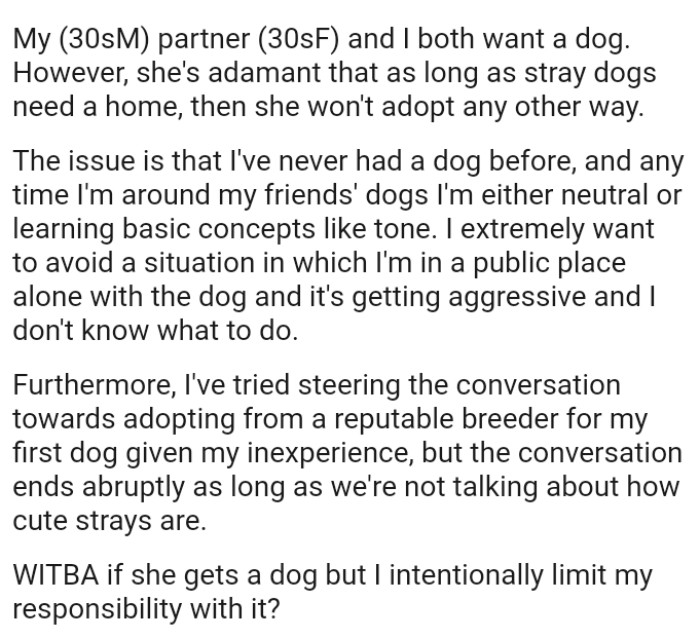
OP has offered the following explanation for why they think they might be the a-hole:
If I say the dog is yours, not ours, does that make me the AH because I am shirking the responsibility of learning dog behavior for traumatized dogs?
Perceptions of dogs as 'purebred' versus 'stray' relate to societal beliefs that influence individual choices. A study from the University of Pennsylvania found that people often project their values onto animals, affecting adoption rates and decision-making.
To foster a healthier perspective, it’s essential to focus on the qualities of the dog rather than its breed. Engaging in community discussions about the benefits of adopting strays can help reshape views and encourage more inclusive attitudes towards pet ownership.
The OP would still need to do basic dog training if he gets from a breeder
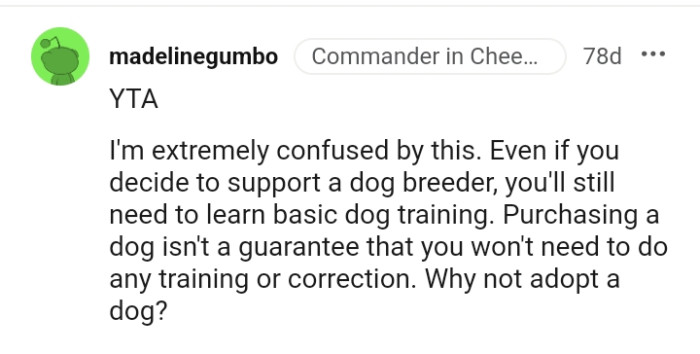
When discussing pet ownership, one must consider the psychological implications of attachment styles. Research by Dr. Philip Shaver and Dr. Mario Mikulincer highlights how secure attachment fosters positive relationships with pets, promoting feelings of safety and comfort.
Conversely, anxious or avoidant attachment styles may lead to conflict, as seen in the couple's disagreement over pet choices. Understanding these dynamics can help individuals navigate emotional responses and enhance compatibility in relationships, particularly when sharing the responsibility of caring for a pet.
The Complexities of Pet Ownership
Dr. Amanda Lee, a behavioral psychologist at the University of California, emphasizes the emotional investment people make in their pets.
Her research indicates that relinquishing a pet can lead to feelings of loss and guilt, often complicating ownership disputes.
When one partner expresses a desire to adopt a stray while the other insists on maintaining ownership of a purebred, it can create significant emotional tension.
The OP should give adoption from a shelter a chance

They will help the OP find a dog that would fit in
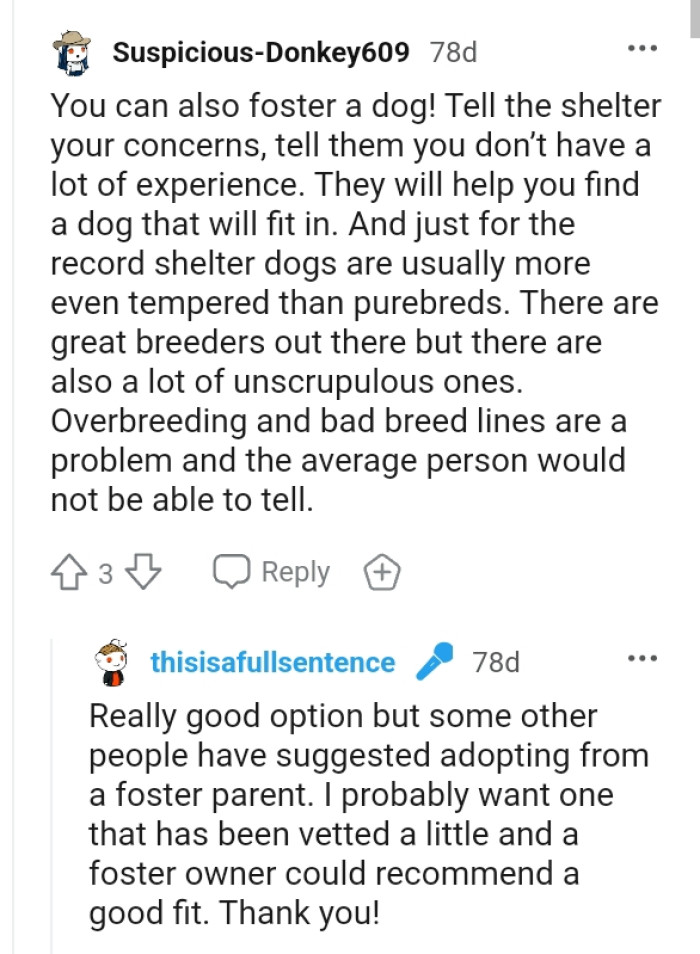
The OP can volunteer to walk or socialize with the dogs
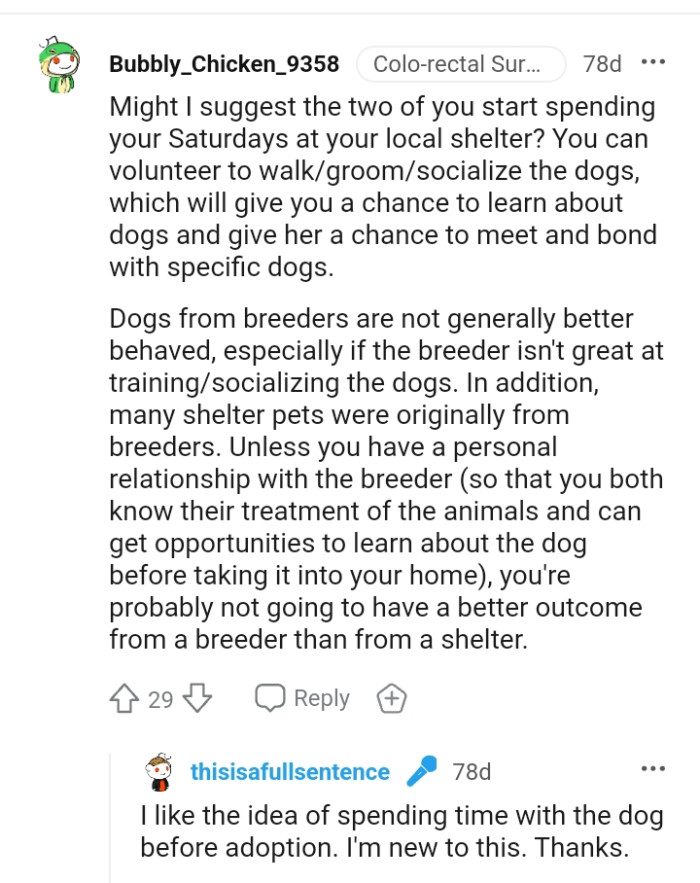
Commitment and Responsibility
Owning a dog is a significant commitment that can evoke psychological responses related to responsibility and guilt. Dr. Helen Fisher, a biological anthropologist and relationship expert, states, "The emotional investment in a pet can create stress and anxiety, especially for those who may not be fully prepared for the responsibilities involved." Couples should engage in open dialogues about their expectations and feelings towards pet ownership, as Dr. Fisher emphasizes, "Communicating openly can alleviate misunderstandings and foster a shared vision of responsibilities, ultimately enhancing relationship satisfaction." For more insights, visit Dr. Helen Fisher's website.
Studies in pet ownership reveal that emotional attachments can lead to intense feelings of possessiveness.
According to research published in the Journal of Applied Animal Welfare Science, these emotions often complicate decisions regarding pet rehoming.
Understanding the psychological implications of these attachments is essential for navigating ownership conflicts.
This Redditor's dog is a rescue and she has never shown aggression
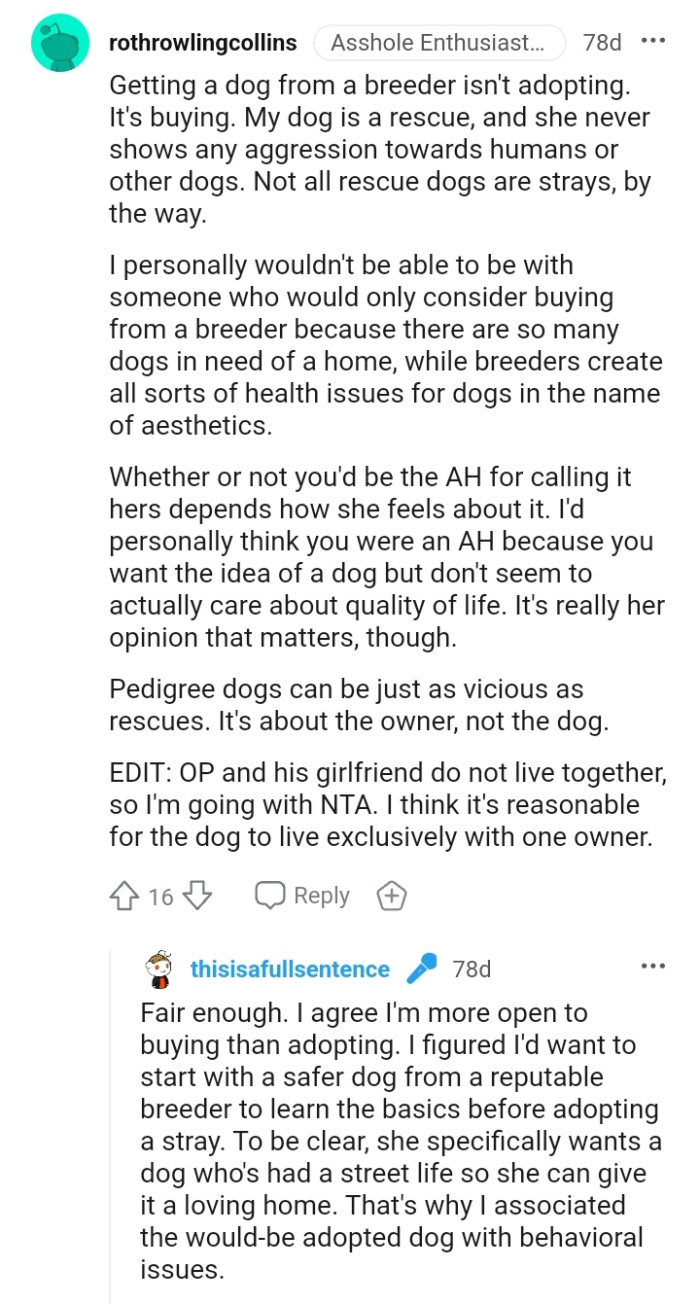
Good rescues screen dogs for behavioral issues
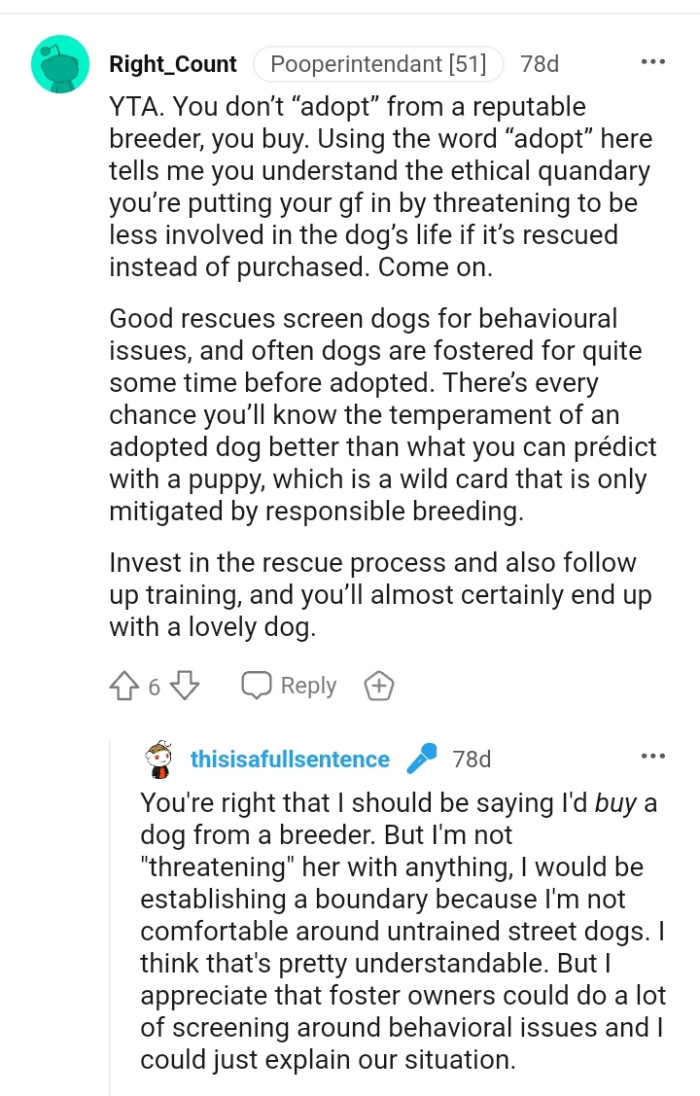
This Redditor thinks the OP is misinterpreting what a stray dog is
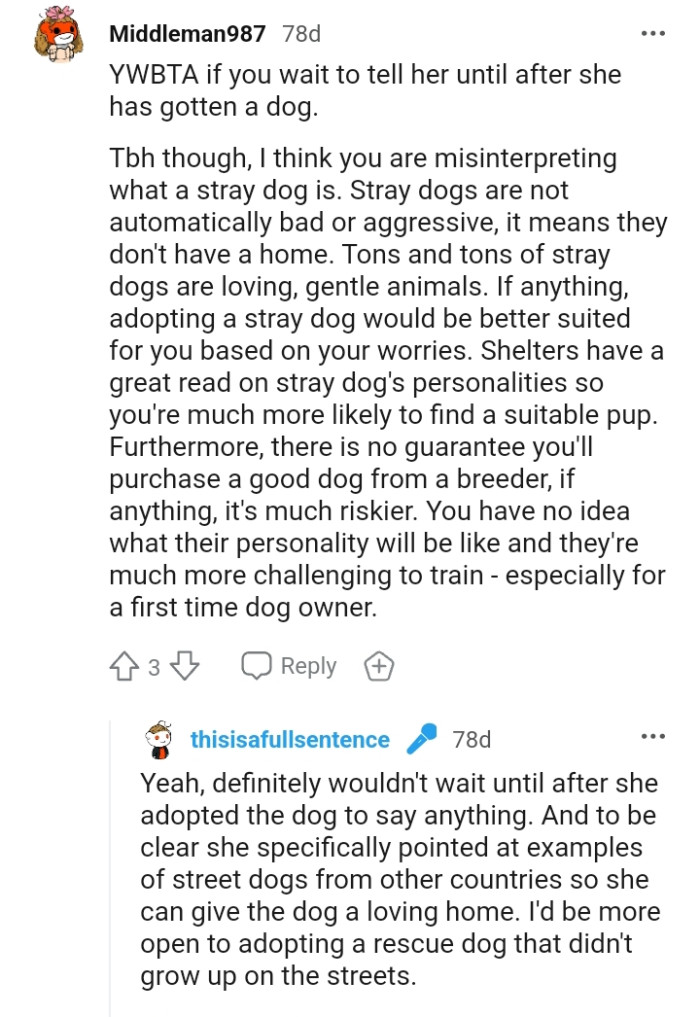
The conversation between the couple reflects a common psychological phenomenon known as cognitive dissonance, where conflicting beliefs create discomfort. Research by Leon Festinger illustrates how individuals strive for harmony between their thoughts and actions.
This couple's disagreement may prompt a reevaluation of values regarding pet ownership. To resolve dissonance, fostering empathy and understanding between partners can lead to collaborative decision-making about adopting pets, which nurtures both the relationship and the emotional well-being of the individuals involved.
Communication in Ownership Disputes
Open communication regarding feelings of attachment and ownership is critical in resolving pet ownership conflicts.
Experts recommend discussing the emotional implications of pet ownership to foster mutual understanding.
This approach can lead to compromise and clarity regarding responsibilities and expectations.
If you can't put in the work, then don't get a dog
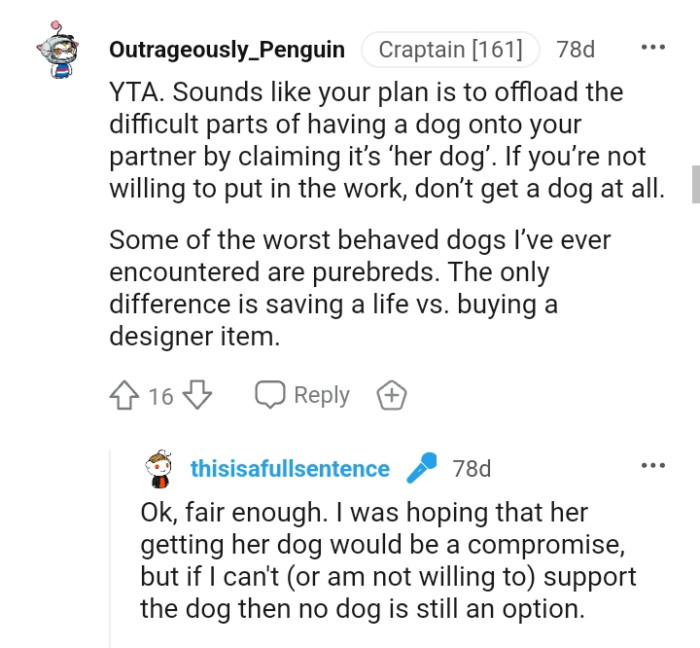
This is something the OP needs to know how to handle as a dog owner
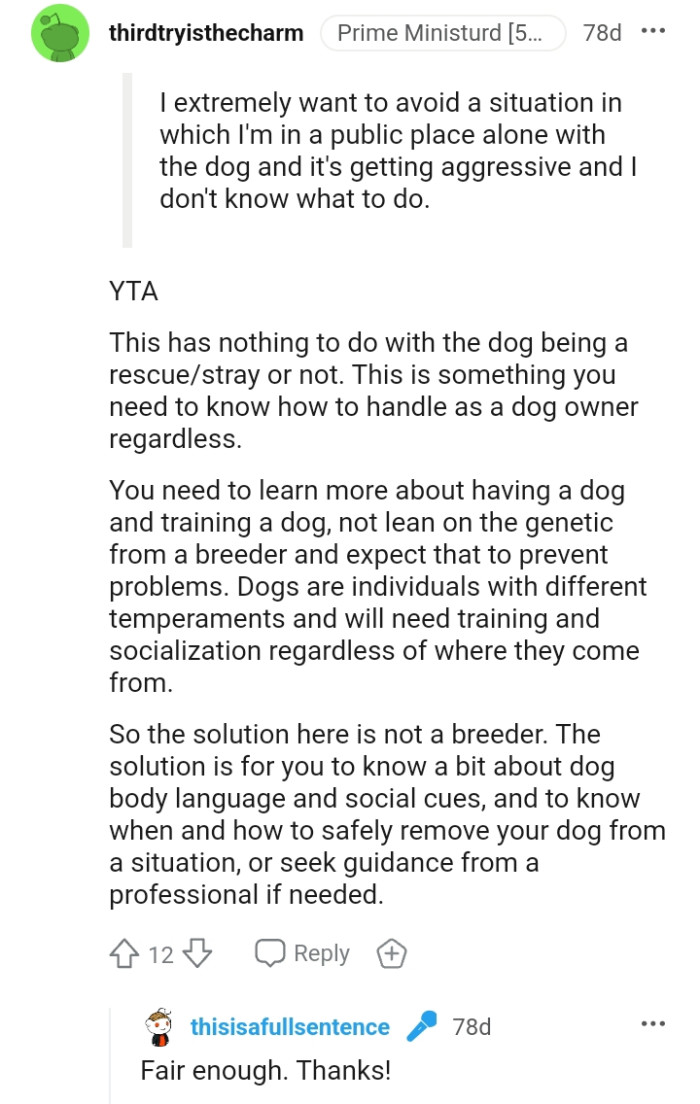
OP's GF clearly knows what to expect
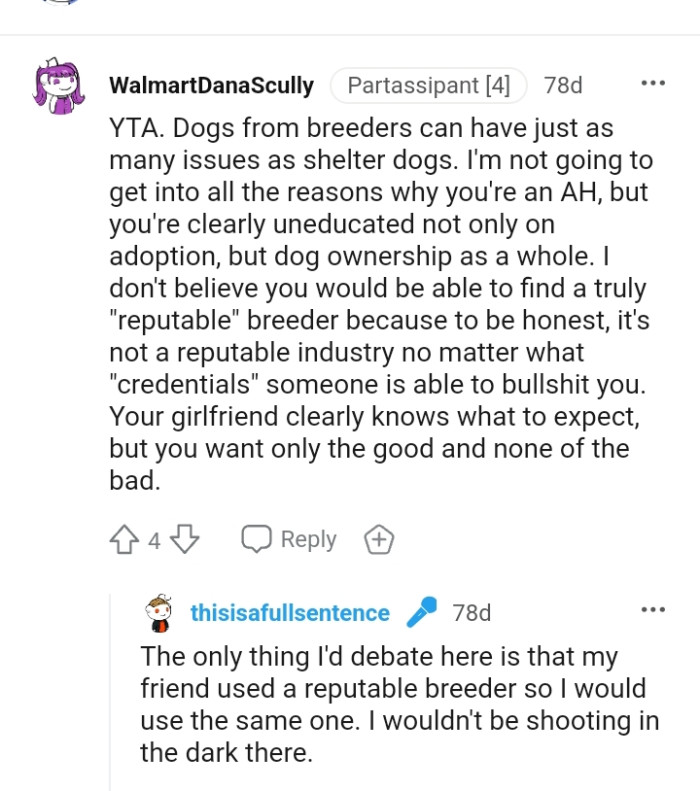
Exploring Emotional Needs
Dr. Sue Johnson, a leading expert in emotionally focused therapy, emphasizes the importance of addressing underlying emotional needs in relationships. In this scenario, the man’s desire for a purebred dog may stem from deeper insecurities regarding status or control.
Encouraging open discussions about these needs can help partners navigate their differences more effectively. Research shows that couples who communicate their emotional vulnerabilities are more likely to develop deeper connections and resolve conflicts more amicably.
Practical strategies for addressing ownership disputes include establishing a clear pet care plan that outlines the responsibilities of each partner.
Encouraging empathy and understanding can help alleviate tensions and facilitate a more amicable resolution.
Additionally, seeking mediation can provide a neutral space to navigate these complex emotions and reach a consensus.
Some Redditors told the OP to inform the shelter about his concerns and that he doesn’t have a lot of experience. The shelter will help the OP find a dog that will fit in.
And just for the record, shelter dogs are usually more even-tempered than purebreds, according to some Redditors. The OP was declared the AH, and that is where we draw the curtain!
Psychological Analysis
This situation highlights the emotional complexities surrounding pet ownership and the need for open communication.
From a psychological standpoint, addressing these emotions is crucial for resolving conflicts and maintaining healthy relationships.
Analysis generated by AI
Analysis & Alternative Approaches
Navigating pet ownership disputes requires sensitivity and understanding from both parties involved.
As noted by Dr. Esther Perel, a renowned couples therapist, "The quality of our relationships determines the quality of our lives." Fostering open dialogue can significantly improve resolution processes.
By prioritizing empathy and collaboration, families can create a supportive environment for their pets.
Psychological Analysis
This situation seems to be driven by a difference in values and fears about responsibility. One partner values helping vulnerable strays, while the other prefers predictability and perceives less risk with a purebred. The man's avoidance of shared responsibility for a stray might also reflect anxiety about dealing with potential behavioral issues. Open communication and empathy could help them find common ground.
Analysis generated by AI
Analysis & Alternative Approaches
The discussion surrounding pet ownership highlights the complexity of relationship dynamics and individual psychological needs. By understanding attachment styles, cognitive dissonance, and emotional vulnerabilities, couples can navigate disagreements more effectively.
Encouraging open communication and empathy fosters collaboration, ultimately enhancing relationship satisfaction. With the right support and insights, partners can align their values and responsibilities, creating a harmonious environment for both themselves and their pets.



